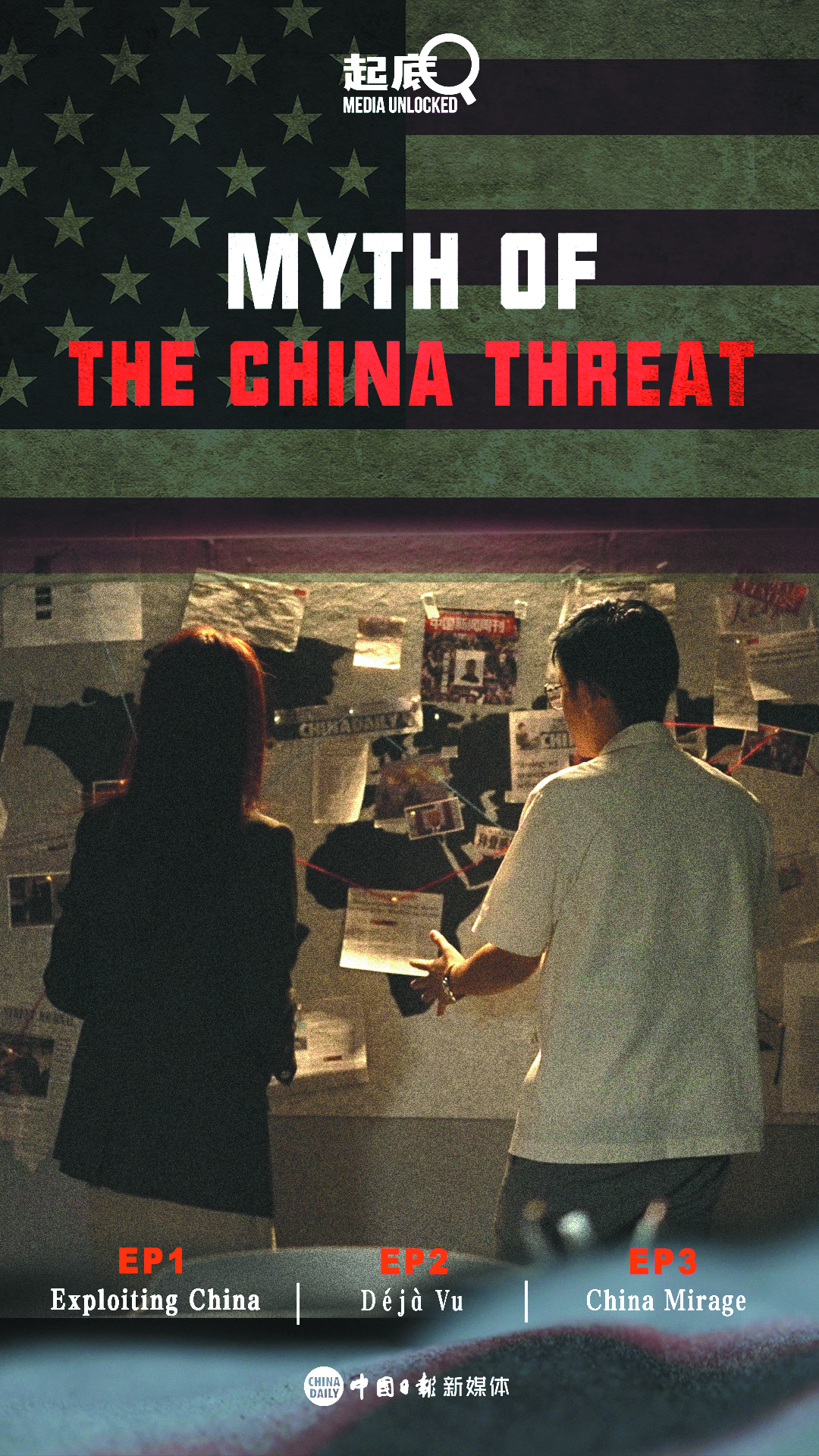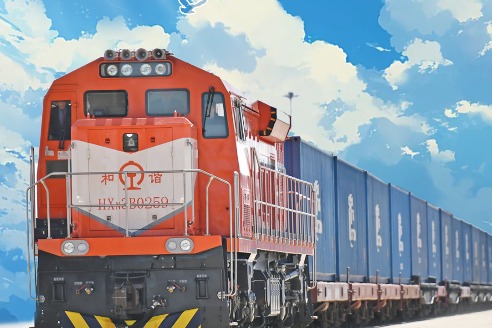A bogeyman born and bred in the USA
By KE RONGYI/XU-PAN YIRU/MENG ZHE | China Daily | Updated: 2023-01-16 07:00

When it comes to running the economy and foreign policy, Washington's politicians often look for someone to blame, and most often it is China
Editor's note: What exactly does the "China threat" mean? China Daily reviews the historical bonds between China and the US by inviting experts, entrepreneurs and influencers to discuss the current status of relations in terms of cultural exchanges, economic connections and military confrontation. The internet documentary series The Myth of the China Threat offers a timely review of the China-US relationship and what it means for the world.
After receiving an offer to study computer science from Vanderbilt University in Nashville, Tennessee, Liu Zheng planned to pursue a doctorate there in 2020. However, Presidential Proclamation 10043 signed by Donald Trump in May of that year left him no choice but to start looking for a job in Beijing instead, he said.
An estimated 3,000 to 5,000 Chinese students who specialize in STEM (science, technology, engineering and math) studies have been denied visas to enter the US because of the proclamation.
PP10043 prohibits students who have graduated from universities it alleges support what it calls China's "military-civil fusion program" from obtaining certain US visas on the grounds that they could engage in espionage. The students say they find the reasoning unconvincing.
The list was compiled by the think tank the Australian Strategic Policy Institute, or ASPI, Liu said. "They did not do real research, but they pin the blame on the victims."
Liu's undergraduate studies, the internet of things engineering, involves operating home appliances using an Android device. Seeing some kind of connection between his studies and China's military is preposterous, he said.
ASPI is known for its ties with the Pentagon, foreign governments and weapons manufacturers, and it has published a series of reports that target Chinese universities based on unverified assumptions.
PP10043 involves a series of moves by the US government that aim at countering the "China threat", with a narrative of a malevolent China and Chinese people acting as government agents controlling the country's foreign policy and popular culture.

China as a looming threat to the US has long become the primary driver of Western media coverage of China. "If we write a favorable story about China it gets put on page 26 of the newspaper, or it's not covered at all," said Stapleton Roy, former US ambassador to China. "But if I talk about Chinese dissidents or Chinese human rights abuses, then I get front-page coverage."
When anyone talks of their experience in China that does not align with the narrative coming from overseas, they are criticized and summarily dismissed as being shills for the Communist Party of China.
"I'm not paid by anybody to say the things that I say," said Jerry Grey, a Briton who has lived and worked in China for nearly 20 years.
"When someone tells me something is true, I'll go off to find out whether or not it is true. Sometimes it is true, sometimes it isn't, but when it relates to China, it's almost 100 percent untrue."
As a direct witness to China's huge development over the past 20 years, he has seen advances across every measurable metric, including health, education, environment, crime and the economy.
For Western audiences constantly bombarded with anti-China misinformation and disinformation, it is easy enough to end up being suspicious of a country most know little about.
Yan Xuetong, a scholar in international relations at Tsinghua University in Beijing, laments the growing divide between China and the public in many other countries.
"The awful thing is that it is not only conflict between governments that is increasing but resentment between people as well."
Some Chinese who have had student visa applications rejected, including Liu, have responded by taking legal action against US government officials, including the secretary of state and the secretary of defense.
At the World Peace Forum in Beijing in July, the US Ambassador to China, Nicholas Burns, when asked whether he was aware of the consequences of PP10043, did not directly address the concern. Chinese students were welcome in the US, he said, and only those who broke laws would be subjected to visa restrictions. The students responded that Burns' response was inadequate and hypocritical.
"That's a very American way to put things," Liu said. "They say one thing and do another. I hope the lawsuit will bring us justice."
Vehicle maker's complaint
Students are not the only ones who feel aggrieved by the way the US government is treating them. Another group is motor vehicle manufacturers.
"We hope some day when we go to California the Californian government can treat us the way the Shanghai government did to Tesla," said Freeman Shen, founder and chief executive of WM Motor, one of the top makers of electric vehicles in China.
Electrical vehicle manufacturing has been one of the major fields of competition in China-US relations. The US has accused China of subsidizing the industry, giving Chinese companies an unfair advantage over their US counterparts.
When WM Motor was founded in 2015 it received debt investment and low-interest loans worth 3 billion yuan ($438 million) from the local government.
"But US companies like Tesla received much more support from the government than we did," Shen said.
Tesla has also received billions of dollars from the US Department of Energy, he said, calling the US accusations groundless.
In 2018 Trump instigated a trade war with China, imposing billions of dollars in tariffs on Chinese products, complaining that for years China had been taking economic advantage of the US. Three years into the presidency of Joe Biden, the tariffs, which many economists in both countries say should be removed, remain in place.
Experts say the tariffs are not only harmful to the global economy but have led the US away from free trade and toward protectionism.
"The US is no longer a free-trade country," Roy said. To support that contention he points to "the launching of a trade war with China by president Trump, the putting on of the China tariffs, the fact that President Biden has left those tariffs in place, the fact that we pulled out of the Trans-Pacific Partnership".
China's growing presence in high-tech has become a top concern for US policymakers. In August US lawmakers passed the CHIPS and Science Act, which gives $52 billion for US companies over five years to grow their semiconductor manufacturing. In October the US imposed sweeping restrictions on China, the intention being clear: to cripple its semiconductor industry and stifle its technological development.
The Biden administration has launched the so-called smart competition with China and has shifted its focus to technology.
"They believe that technology will determine whether the US can maintain the military and economic advantage, vis-a-vis China," said Wu Xinbo, dean of the Institute of International Studies at Fudan University in Shanghai. With growing tensions between the two countries, experts have called for proper management of all the issues.
Daniel Russel, former US assistant secretary of state for East Asian and Pacific Affairs, said: "There is a real urgency for the US and China working to heal their bilateral relations overall, and to ensure that the competition between us, which is inevitable, is the kind of constructive competition that makes both sides better, better competitors, and not the destructive rivalry in which each side is seeking to harm and undermine the other."
Military bases trigger concern
After being stationed on the Japanese island of Okinawa for two years, Brian Berletic, a former US marine, said he began to understand that the US military presence was not about bolstering regional stability but about undermining it.
"It was a source of constant tension," Berletic said.
Every year the US pours billions of dollars into building and maintaining its overseas military bases. But the US military presence at such bases has triggered protests rather than gratitude.
"We're talking rape, murder, assaults, things like that," said Robert Kajiwara, an activist and writer in Okinawa. "US soldiers are infamous for doing this. They particularly target Okinawan women and children, as well as the elderly."
More than 30 US military installations have been built in Okinawa, just a fraction of the hundreds of US military bases that encircle China. Every year the US military flies thousands of spy planes over the South China Sea, and naval ships frequent the region with growing intensity.
The US argues that its military buildup is needed to counter China's alleged threat to the region.
"No country will believe that the United States may use its military power to seize territory," Russel said.
"The United States is using its military power to maintain international security and stability, especially in Asia."
The number of US surveillance sorties in the South China Sea is likely to increase compared with 2021, said Wu Shicun, founding president of the National Institute for South China Sea Studies.
Increased US military activity in the Western Pacific is because it is concerned about losing its dominance, he said. "In 2021 the US flew over 1,200 spy plane sorties over the region and held 95 US-led military exercises. The frequency and intensity increase year by year."
In a world atlas published by Rand McNally in 1992, the Nansha Islands were described as "Nansha Island (China)", Wu Shicun said. In addition, the South China Sea islands were described as being part of Guangdong province, he said.
China's GDP is about 70 percent that of the US despite having the largest population in the world. However, China's national defense budget was 1.4 trillion yuan ($204 billion) last year, less than one-third of the US defense budget.
Wu Xinbo of Fudan University said the US military has already targeted the Chinese military as a major imaginary enemy.
US military spending in 2021 reached $801 billion, and it is expected to continue to increase this year and in the years ahead. Wu Shicun said: "Who would think of buying weapons from the US if it does not hype tensions?"
Contact the writers at xupanyiru@chinadaily.com.cn.
























